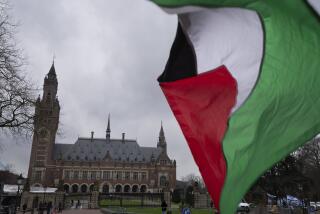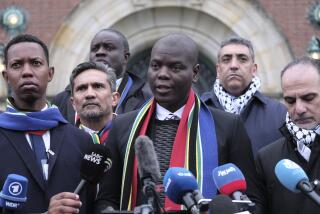War Crimes Tribunal Drifting in Uncharted Legal Waters
- Share via
THE HAGUE — Its mission is to bring those responsible for barbaric deeds in the Balkans to justice, but at the International Criminal Tribunal for the Former Yugoslavia, the wheels have been grinding with excruciating slowness.
It took the Nuremberg trial organized after World War II less than a year to try about two dozen surviving members of the Nazi elite, the overwhelming majority of whom were convicted; a dozen of them were ordered hanged. To date, the tribunal established in this Dutch city by the United Nations Security Council in May 1993 has handed down a single definitive verdict and sentence.
Drazen Erdemovic, 27, a Bosnian Croat who enlisted in the Bosnian Serb army, is serving a five-year term in a Norwegian prison for having belonged to firing squads that killed Muslim civilians during Bosnia-Herzegovina’s 1992-95 civil war. He pleaded guilty.
Other cases before the court, housed in the onetime headquarters of an insurance company, are proceeding at such a pace that a tribunal judge, Claude Jorda of France, complained that if Yugoslav President Slobodan Milosevic, charged with war crimes and crimes against humanity in Kosovo, were arrested tomorrow, it would be three years before time could be found on the docket for his case.
When Carla del Ponte of Switzerland takes over as chief prosecutor from Louise Arbour of Canada next month, one of her challenges will be to make the machinery move faster. Some observers say that may mean issuing fewer indictments targeting only the reputed masterminds, and focusing all efforts on apprehending and trying them. Of the 35 indicted and publicly identified suspects who remain at large, many, like Milosevic, are major figures.
“As far as I’m concerned, they simply can’t try every Tom, Dick and Harry,” Avril McDonald, a former court official from Ireland, said.
McDonald, who monitors the tribunal for a legal institute at The Hague, points out that the first trial, of Dusan Tadic, a Bosnian Serb accused of torturing and killing Muslims, dragged on for three years. A separate appellate judgment last month found him guilty of war crimes and violations of the Geneva Convention, but sentencing is still pending.
“And don’t forget, he’d been in custody for two years before all this,” McDonald said.
Six other guilty verdicts have been appealed. The prosecution has appealed the lone acquittal.
Officials at the jury-less court, which has three separate chambers and is chaired by an American, Gabrielle Kirk McDonald of St. Paul, Minn., admit to frustrations but attribute the slow start to being in virgin legal territory.
The 14-judge tribunal also must answer to a diverse group of masters--the 15 member nations of the Security Council. And it wasn’t until July 1997 that NATO-led troops in the former Yugoslav federation made their first arrest of an indicted suspect.
“These early trials that are taking place now, they are really still testing the waters, testing the procedures,” deputy prosecutor Graham Blewitt of Australia said in an interview. He acknowledged that prosecuting attorneys engaged in “overkill” in the Tadic case and other early trials but said that was because they had no idea how much evidence would sway the judges.
Gambits by the defense have also played a part in slowing the pace. In fact, Blewitt contends, if actual time in the courtroom is measured, the tribunal has been moving as fast as major criminal trials in most Western countries.
Despite that, he said, “a formula has to be found that will have the court busy all the time.” Judges could organize separate morning and afternoon trials so delays in a case wouldn’t paralyze the chamber. Or trials could run full time but flip-flop every week.
Prosecutors also are trying to organize multi-defendant trials where possible. Arbour has already announced her intention to try Gen. Momir Talic, the Bosnian Serb military commander arrested in Vienna on Wednesday, along with an imprisoned former Bosnian Serb deputy premier. Both are accused of organizing the large-scale “ethnic cleansing” of non-Serbs in Bosnia.
More to Read
Sign up for Essential California
The most important California stories and recommendations in your inbox every morning.
You may occasionally receive promotional content from the Los Angeles Times.













